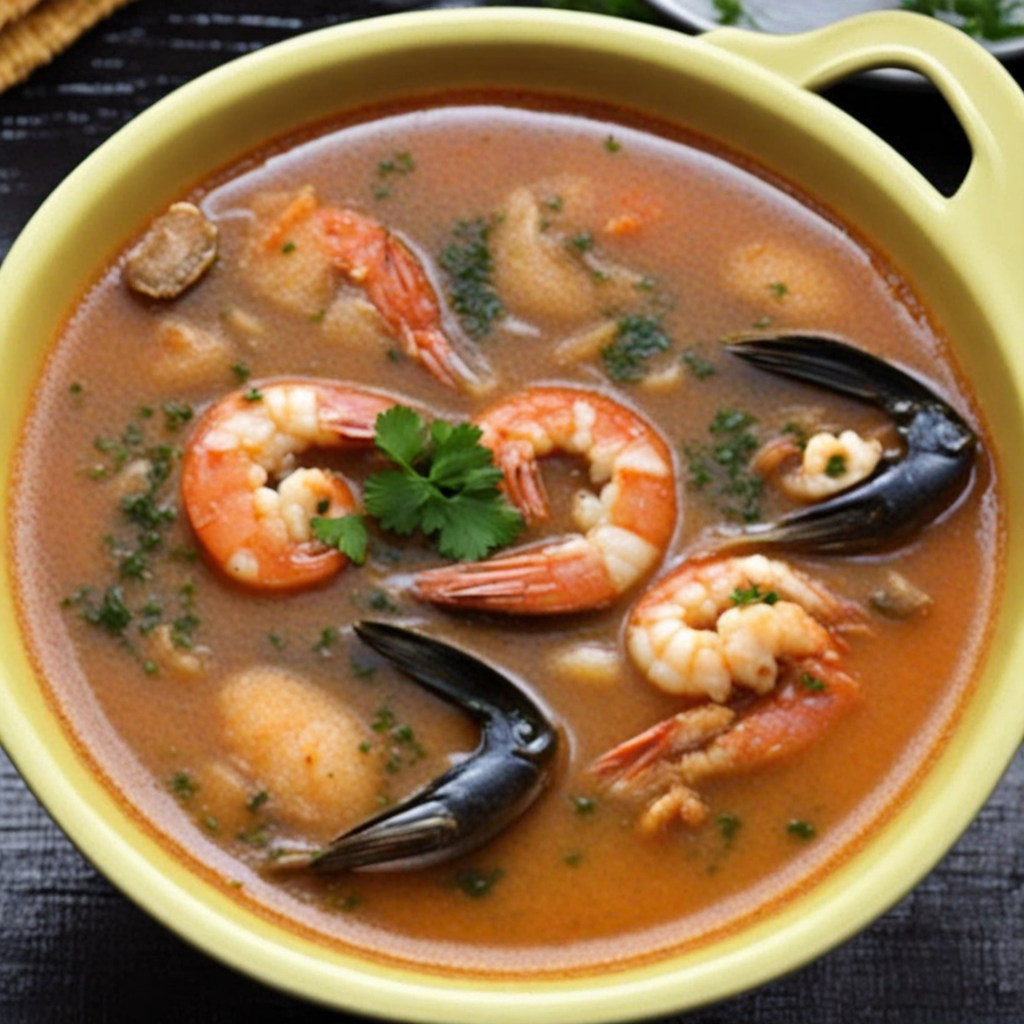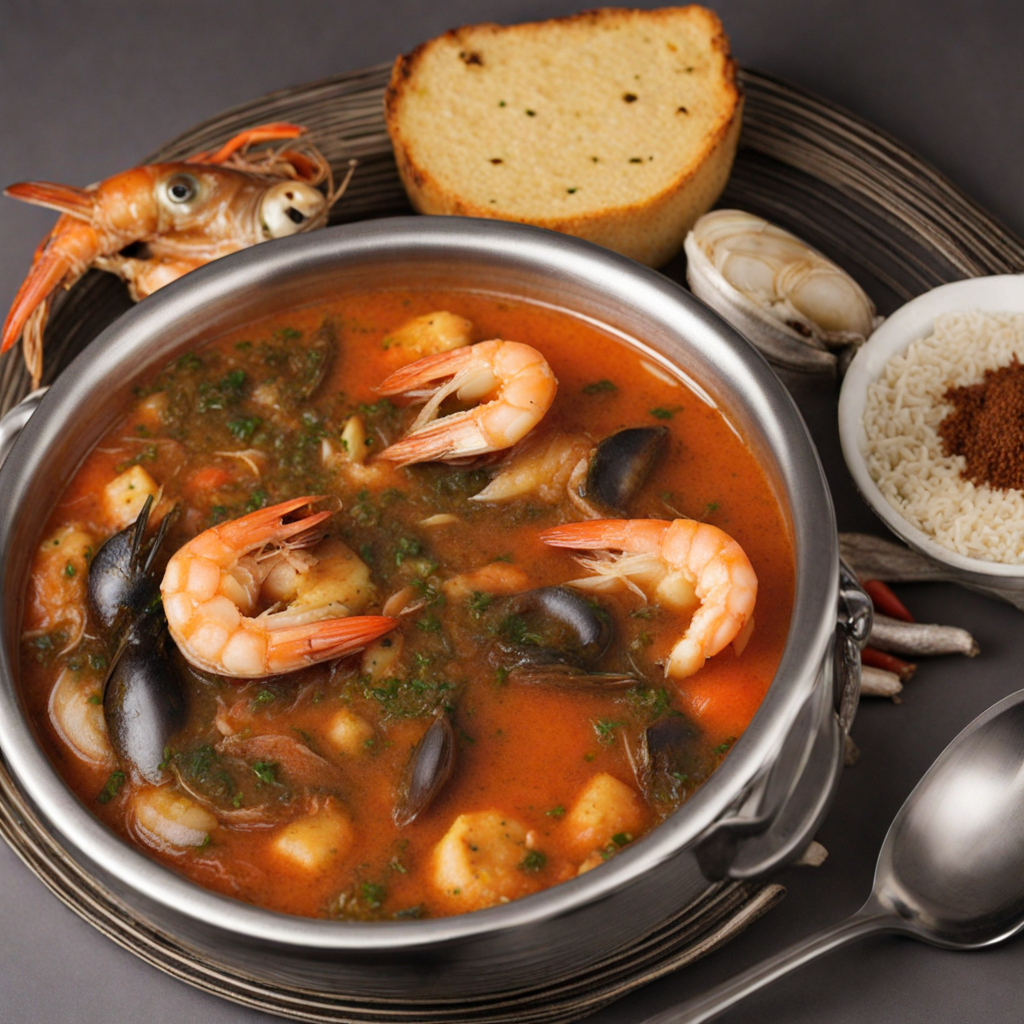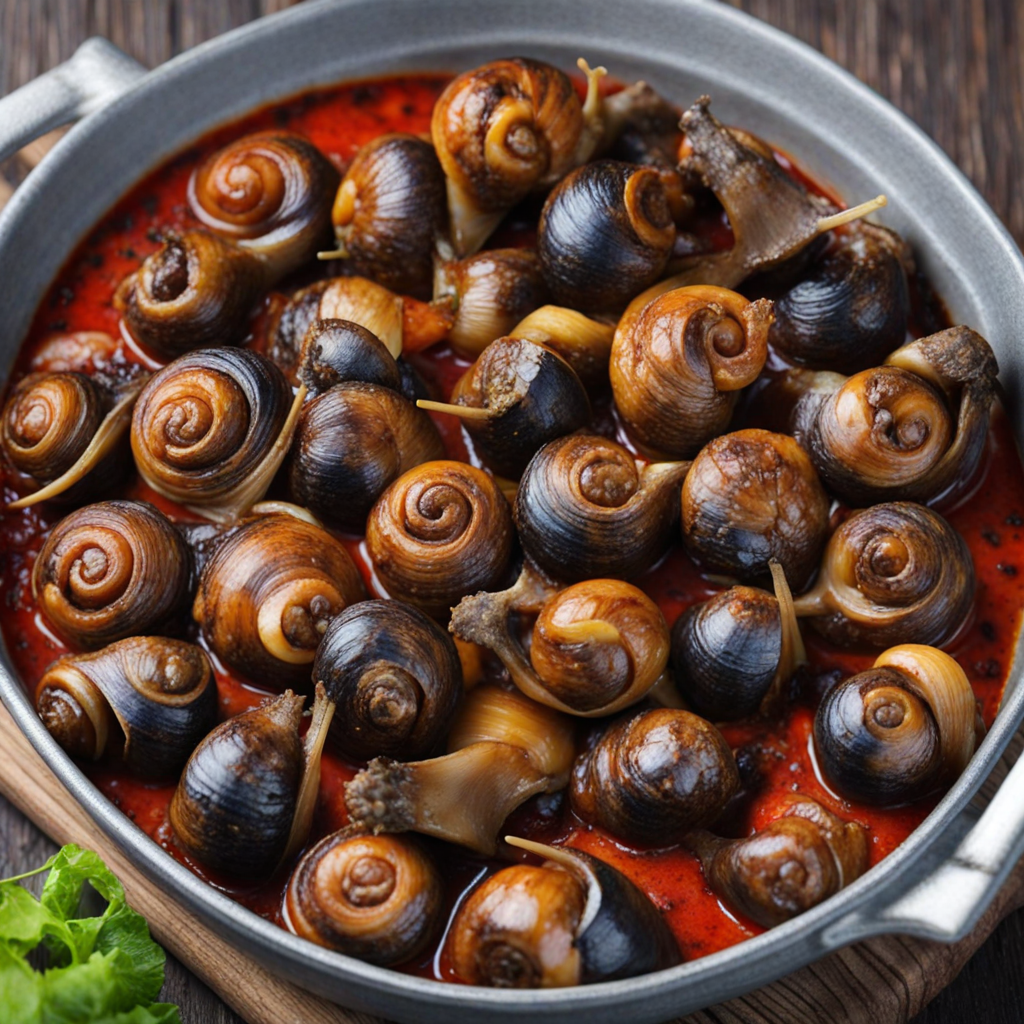Fisherman Soup
Fisherman Soup, known locally as "Ofe Nsala" or "White Soup," is a traditional dish that embodies the rich culinary heritage of Nigeria, particularly among the Igbo people. This soup is a fragrant and slightly spicy broth that prominently features fresh fish, often catfish or other local varieties, which impart a distinct flavor to the dish. The preparation begins with a base of ground crayfish and a blend of spices, including pepper, which provides a gentle heat that enhances the natural taste of the seafood. Unlike many Nigerian soups, Fisherman Soup is characterized by its light and watery consistency, making it a refreshing option that pairs beautifully with starchy sides like pounded yam or fufu. One of the most captivating aspects of Fisherman Soup is its use of indigenous ingredients that contribute to its unique flavor profile. The soup is often thickened with yam or cocoyam, which not only adds smoothness but also a subtle earthiness that complements the fish. The incorporation of fresh herbs, such as scent leaves or basil, adds aromatic notes and a vibrant color, making the dish visually appealing. Each spoonful is a delightful balance of savory and umami, with the fish tender and infused with the rich broth's essence. Fisherman Soup is more than just a meal; it is a cultural experience that brings together families and communities, often enjoyed during special occasions and festive gatherings. The dish is usually served in communal bowls, encouraging sharing and bonding over a delicious meal. Whether you are a seasoned food enthusiast or a newcomer to Nigerian cuisine, Fisherman Soup promises a memorable exploration of flavors, textures, and the warmth of Nigerian hospitality.
How It Became This Dish
The History of Fisherman Soup in Nigeria: A Culinary Journey Fisherman soup, known locally as “Ofe Nsala” or “Nkwobi” in some regions, is a traditional dish that encapsulates the rich tapestry of Nigeria’s culinary heritage. Originating from the southeastern part of the country, particularly among the Igbo ethnic group, Fisherman soup is not just a meal; it is a symbol of community, tradition, and the bountiful resources that Nigeria's rivers and coastal areas provide. Origins The roots of Fisherman soup can be traced back to Nigeria's agrarian and fishing communities. The Igbo people, known for their strong agricultural practices and fishing techniques, relied heavily on the rivers and streams that crisscrossed their land. In these fertile regions, fishing was not only a means of sustenance but also an integral part of the culture and economy. The soup itself reflects this rich relationship with nature. Fisherman soup is traditionally made with fresh fish, often caught from the nearby rivers. The ingredients vary depending on the catch of the day and the availability of local produce, but the core elements typically include fresh fish, catfish being a popular choice, and a variety of spices and seasonings. The soup is thickened with ground crayfish and often complemented by the use of palm oil or local herbs, which enhances its flavor profile and nutritional value. Cultural Significance Fisherman soup holds a significant place in the social and cultural fabric of Nigerian society, particularly among the Igbo. It is often served during communal gatherings, celebrations, and festivals, symbolizing unity and sharing among families and friends. The preparation of the soup is a communal activity, where family members gather to clean the fish, prepare the ingredients, and cook together. This collective effort fosters social bonds and reinforces familial ties. In addition to its role in communal dining, Fisherman soup is often associated with traditional rites and ceremonies. It is a dish that graces the tables during weddings, naming ceremonies, and other significant life events. In these contexts, the soup serves not only as sustenance but also as a means of honoring ancestors and acknowledging the blessings of the community. Development Over Time As Nigeria has evolved, so too has the Fisherman soup. The dish has undergone various transformations influenced by globalization, urbanization, and changing dietary preferences. In the early 20th century, the introduction of new fishing technologies and preservation methods, such as refrigeration, allowed for a wider variety of fish to be used in the soup. This advancement made it possible for the dish to be prepared with fish not only sourced locally but also imported from other regions of Nigeria and beyond. The globalization of food culture has also introduced new flavors and ingredients to the traditional recipe. Today, some cooks incorporate ingredients like tomatoes, peppers, and other spices from diverse culinary traditions, creating unique variations of the classic Fisherman soup. This fusion of flavors reflects the dynamic nature of Nigerian cuisine, where traditional and modern influences coexist. Moreover, as urban centers like Lagos and Abuja flourish, the demand for convenience and rapid meal preparation has led to the emergence of pre-packaged and instant versions of Fisherman soup. While these products offer a fast alternative to the traditional method of preparation, they often lack the depth of flavor and cultural significance that comes from the communal cooking experience. Modern Interpretations and Global Influence In recent years, Fisherman soup has gained recognition beyond Nigeria's borders, attracting the attention of food enthusiasts and chefs worldwide. The unique flavors and cultural significance of the dish have made it a focal point in the growing interest in African cuisine. International food festivals and culinary events have showcased Fisherman soup, allowing for a broader audience to appreciate its rich heritage. Chefs and home cooks alike are experimenting with Fisherman soup, putting their own spins on the traditional recipe. Some have ventured into gourmet interpretations, pairing the soup with artisanal bread or incorporating elements of molecular gastronomy, while others emphasize sustainable fishing practices and local sourcing of ingredients. This evolution highlights the adaptability of Nigerian cuisine while respecting its foundational elements. Furthermore, the rise of social media platforms has played a crucial role in popularizing Fisherman soup. Food bloggers and influencers share recipes, cooking techniques, and personal stories related to the dish, fostering a sense of community among those who appreciate Nigerian culture and cuisine. This digital engagement has also encouraged younger generations to reconnect with their culinary heritage, ensuring that traditional recipes are preserved and passed down through families. Conclusion Fisherman soup represents more than just a dish; it is a reflection of Nigeria’s culture, history, and the people who have cherished it for generations. From its origins in the fishing communities of the southeastern region to its modern interpretations and growing global recognition, Fisherman soup embodies the resilience and adaptability of Nigerian cuisine. As it continues to evolve, the essence of Fisherman soup remains rooted in its cultural significance—an emblem of community, tradition, and the relationship between people and nature. Whether enjoyed in a bustling city or a quiet village, Fisherman soup serves as a reminder of the power of food to bring people together and celebrate the rich tapestry of life.
You may like
Discover local flavors from Nigeria






